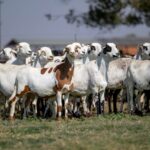When Quinty Rabophala began her farming journey in 2018, she was inspired by her family’s agricultural roots and her determination to make a difference in the sector.
In 2020 she combined her master’s degree in Agricultural Economics with hands-on farming to create a business focused on sustainability, growth, and impact, officially launching Kenokatha Farms during the challenges of the Covid-19 pandemic.
This year, Rabophala’s dedication was recognised when she won Top Entrepreneur for Siyakhula Programme and Woman in Business Champion at the 10th Annual National Enterprise Development Awards (NEDAs), hosted by Black Umbrellas, a Cyril Ramaphosa Foundation partner entity. Black Umbrellas supports the development of 100% Black-owned small through a digitally-enabled incubation programme.
“These awards confirm that what we thought could work actually is working. Now, I get to proudly call myself an award-winning farmer. It’s a reminder to keep going and to inspire my team to realise their potential too,” she says.
Starting with a 1.5-hectare plot in Midrand, Johannesburg, Rabophala has steadily scaled her operations. Today, Kenokatha Farms boasts an eight-hectare farm in Botlokwa, Limpopo, and her family’s ten hectare farm in Mashite, Lebowakgomo, which she integrated as an out-grower.
Kenokatha specialises in niche vegetables like baby marrows, broccoli, green beans, and sugar snap peas, supplying retailers and markets across South Africa.
Key to her success has been overcoming challenges such as market access and compliance. Early setbacks like losses due to the lack of secure markets and necessary certifications motivated Rabophala to seek solutions.
In 2023, Rabophala joined the Siyakhula Programme through Black Umbrellas, which she credits for transforming her business approach.
“The programme taught me invaluable lessons, particularly the importance of compliance and the value of delegating tasks. It’s not about doing everything yourself but empowering your team and growing together,” she explains.
Compliance has been at the heart of Kenokatha Farms’ growth strategy. Rabophala is currently working towards Global GAP certification, a benchmark for food safety and quality that will allow her to export her products. With support from a food safety programme by SPAR, she’s implementing systems to meet these stringent standards.
“Compliance is essential. It’s not that our products aren’t good enough, but we need the paperwork to prove it. I’ve put everything I have into meeting these standards, and it’s paying off. We’re on track for an audit in December, and I’m confident we’ll get there,” she says.
Rabophala has also expanded her reach. While her Midrand operation hires up to 15 seasonal workers during peak times, her Limpopo farms are being prepared for similar levels of productivity. The integration of her family’s farm has further strengthened her supply chain, ensuring consistent delivery to markets.
To achieve her goal of supplying top-tier retailers and expanding into export markets, Rabophala is pursuing funding to cover critical infrastructure needs. She recently applied for an Agri BEE matching grant, seeking R5 million to build a compliant packhouse, purchase refrigerated trucks, and improve logistics.
“The funding will help us eliminate gaps in the supply chain. Currently, we’re delivering produce in open vehicles, which isn’t ideal for maintaining quality. With proper infrastructure, we can ensure our products meet the highest standards,” she explains.
While the grant requires a 10% contribution, Rabophala is working tirelessly to secure the necessary R500,000 to unlock these opportunities.
For Rabophala, farming is more than a business, it’s a platform for empowerment. She’s passionate about creating jobs and nurturing talent within her community, providing permanent employment to six staff members and seasonal opportunities to many more.
Her future plans include continuing to grow her core business. The Siyakhula Programme has inspired her to rebrand and refine her vision, positioning Kenokatha as a leader in innovation and sustainability.
Her advice to aspiring entrepreneurs is: “Start where you are and use what you have, but never stop learning. Surround yourself with people who share your vision and grow with them.”
With her determination, Rabophala is proving that with the right support and resilience, South Africa’s agricultural sector can thrive.
Join 'Farmers Mag' WhatsApp Channel
Get the latest Farming news and tips delivered straight to your WhatsApp
CLICK HERE TO JOIN






